History of Bouzoukia - Rempetika Music
Rembetika Songs
Rembetika are small simple, songs sang by plain people. The history of rembetiko is quite short (30-40years) but this kind of music played a very important role to the development of Greek songs and it is referred as the connecting point of 19th century music with 20th century music in Greece.
Many factors have lead to the creation of rembetiko and its formation during its short life span. Folk, Byzantine, Balkan, Turkish and eastern music and many factors of social content such as the way of life (prison, crimes etc) and big historical events such as the destruction of Smyrna in '22, the industrial revolution and the wars were only a few of the reasons which formed this kind of music.

The three periods of Rembetiko
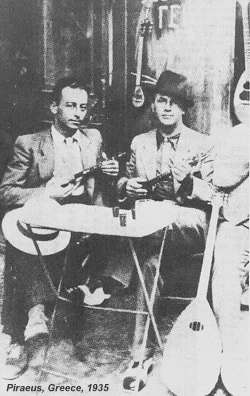
Rembetiko is divided in three time periods and these divisions are very important since they follow the history of Greece. Thus, Rembetiko is divided in the three following ten-year periods:
First Period: 1922-1932
Rembetiko is influenced by the music of Smyrna and the eastern style. The destruction of Smyrna enrich the Greek music with different types of songs, amanedes, taximia, singers from Smyrna and eastern musical instruments (sandouri, outi, kanonaki, sazi). Cafť Aman is the main provider of this kind of music and the first recordings take place.
Second Period: 1932-1942
The second decade of Rembetiko is the purest. The musical instruments from the east get replaced by bouzouki, baglama and guitar. At this point rembetiko is a way of life for the outlaws, the poor, the unappreciated from society, the drug addicts and the prisoners.
Third Period: 1942-1952
During the third decade the style of the songs changes and musical geniuses make their appearances such as Tsitsanis, Chiotis, Mitsakis and many more. Music becomes more and more complicated and difficult to be performed. This is a difficult time for the Greek people.
The times before rembetiko... the beginning
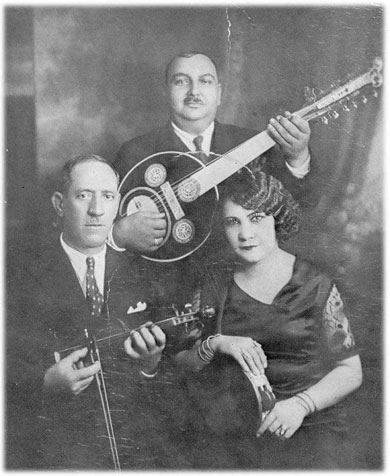
It is obvious that it took some time for rembetiko to make its appearance and that a series of factors helped its creation. What was happening in Greece before the appearance of rembetiko?
After the revolution of 1821 the fist Greek state is formed in 1829 including Sterea Ellada, Peloponnese and the Cyclades. Meanwhile the Greeks inhabit other areas such as Macedonia, the Dodecanese and Minor Asia. During 1833-1863 during the reign of Othonas Syros develops and it becomes a center of commercial transactions. During the decade of 1870-1880 the port of Piraeus develops and this coincides with the industrial revolution in Greece that never reached the levels of Europe. From 1890 till the beginning of the 20th century people start migrating to America. The Greeks of America are the ones who will record Greek songs for the first time (1910-1934). They record songs from Smyrna, folk songs and rembetika written till then from unknown lyrists in prisons and in tekedes, the places where the rembetes went to smoke their forbidden cigarettes. These songs were becoming known from word of mouth.
These songs make their appearance in the end of the 19th century and the beginning of the 20th and they are songs of the lower social ranks and the big urban centers-ports (Smyrna, Constantinople, Thessaloniki, Piraeus). Rembetiko was developed by the simple people of the cities, the poor, the socially rejected, prisoners and outlaws. A group of such people were the "koutsavakides", a group of outlaws who were rembetes as well, with their own way of life (songs, habits, interests). Rembetiko was born because of them from 1867-1897 but later on they were eliminated by Bairakataris
The most important event that affected rembetiko after the Balkan wars (1912-13) and the first world war (1917), was the destruction of Smyrna in 1922) and population exchange. Thjis way there is a mix of the two kinds of rembetika songs, the one created by otlaws in prison and the one from Smyrna. Important composers of the time were: Dragatsis, Karipis, Tountas, Semsis, Yovan Tsaous, Paul and the singers: Rosa Eskenazi, Rita Abatzi, Marika Papagika, Antonis Ntalgas and Nouros. Although the first recordings took place abroad in 1907-1910, organized recordings take place in Greece as well after 1931 with the help of big record companies.
The Rembetes
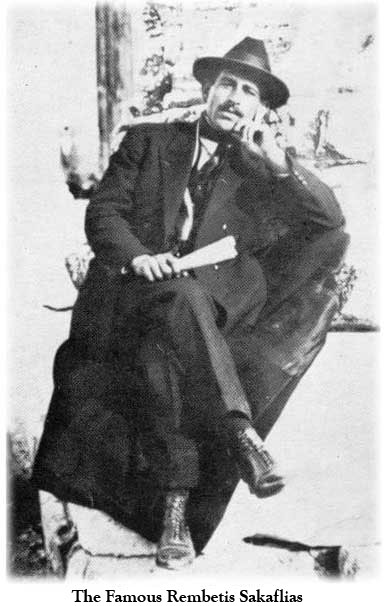
The word rembetis comes from the Turkish word rembet which means naughty and restless. As we have already said the rembetes were outlaws and people rejected by society and that's why they had invented their own way of life but that didn't mean that they were dangerous or criminals. Their difference was that they had developed habits that were conflicting with the laws such as the smoking of hashish and fighting which was leading them to prison very often. Many famous rembetes had served time for small or bigger crimes. Inside the prisons they made their own musical instruments but they usually used the baglamas which was a small, easily hidden musical instrument. Their songs were about the injustice of society, their pain and their life. Prisons were the main subject for rembetika.
The second most important location was the "tekes". There, the rembetes of the cities had the bad habit of smoking hashish. In the beginning of the 20th century they were gathered there in groups to smoke the water pipe with Turkish hashish. Many times musicians were there to play music. Markos Vamvakaris, in his biography mentions that he started his career from "tekedes" where the use of hashish was of course illegal but laws were not followed. During the dictatorship of Metaxas hashish users were chased and put to prison so the rembetes kept smoking on the hills or in caves. Of course, in this world there were other kinds of drugs too that many of the rembetes had decided to try, such as Anestos Delias who died from a heroine overdose when he was 28.
As we have already mentioned the rembetes had their own lifestyle, dress code or even language and their love lives were tempestuous. Most of them were working and music was a way of expression for them in order to share their problems with others. Although their lives were different they had ideals, honor and dignity were their first concerns, they loved women and especially their mothers, they valued friendship, togetherness and kindness.
Not only the outlaws from Piraeus were involved with rembetiko. Greek refugees from Smyrna maintained their own style in rembetiko. Women singers of rembetiko are an important part of this music. They also lead a different life than the women of high society or country women. Women such as Stella Haskil, Ioanna Georgakopoulou, Sotiria Bellou (after the war), Daisy Stavropoulou (recorded only 28 songs) and women such as Abatzi, Eskenazi, Papagika and Politissa who have sung the rembetika of Smyrna have left their mark on the history of music.
Names such as Sotiria Belou, Vasilis Tsitsanis, Markos Vamvakaris and Giannis Papaioannou are still heard and admired today and they will always be remembered for their music.

Athens Nightlife-The Greek Bouzoukia


You may often hear Greeks brag about their ability to have fun or people who have been to Greece talking about the wild nightlife of Athens and the islands and that is absolutely true! The only way to find out is in person!
A characteristic example of how much Greeks value their nightlife is the fact that a few years ago a measure of closing the night clubs earlier was imposed which was withdrawn after a virtual rebellion!
Although Athens is full of clubs and bars of every kind, the most common way to have fun in the Greek capital, and mainly the most unique, is attending the Greek Bouzoukia!
For those of you who havenít heard of this word again, bouzouki is a musical instrument very popular in Greece and bouzoukia the plural form of the word bouzouki. In those nightclubs some of the most famous Greek singers perform live on stage with live music while the audience is sitting down (at least in the beginning) at tables enjoying drinks and less often some food. Drinks are accompanied with nuts or fruit. As the night evolves people start dancing on the dance floor, on tables and chairs. This is a vary common practice in Greek bouzoukia along with the habit of the guests throwing carnations to the singers as a token of admiration. The party goes on till early in the morning when they all go to eat something at one of the all night restaurants.
So, in a nutshell, the procedure is as follows:
First you find out which nightclub to visit.
This depends on the artists that are performing there, if you donít know any of the Greek celebrity singers just ask around and find out although I am giving you a few suggestions below and some of the best bouzoukia in town!

Second, you call to make a reservation, especially if it is Friday or Saturday since these places are usually packed with people. You can also stand at the bar if you want so no reservation is necessary but have in mind that it is so crowded that you wonít be able to move or see the artistsí faces, although it is cheaper than paying for a table.
Get there at midnight which is quite early in order to see the less famous singers as well who perform in the beginning. The grand stars will appear around two in the morning and sometimes even later. Youíll understand when this time comes because everybody will start singing, shouting, whistlingÖ I knowÖ itís all so Greek to you!
Buy some carnations from the girls selling them, you will see them donít worry there are dozens of them, and as soon as you see a singer that you like throw some at him. He will nod and smile at you and he may even come and sing towards you. Look at him and smile since you wonít understand a word he is saying.
When you hear a song that you like, get on the dance floor or if itís too crowded just hop on your table or chair and dance. Imitate the moves of others if you donít know how to dance the Greek way, itís not difficult, just go with the flow. Who cares if you donít do it right!
If you are thrilled by a singerís performance (or looks) go backstage ask for an autograph and chat with the artist. See how easy it is? Would Madonna do that for you?
Around 5 in the morning, as soon as you understand that you are drunk enough, go out, take a taxi and go back to the hotel or visit one of the all night restaurants for some soup. I know it seems weird but this is part of the ďbouzoukia ritualĒ. Some of the best restaurants for soup after bouzoukia are found in Varvakeios Agora in central Athens.
Now itís time to go to the hotel and get some sleep, mission accomplished! You have managed to see the real Athens by night!
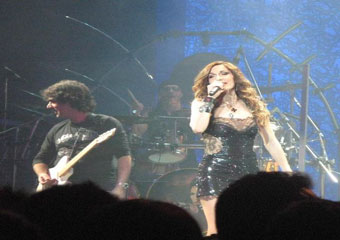

Here is a table of some of the best bouzoukia night clubs of Athens to choose from. In these places you will even find world known Greek artists performing live, such as Yiannis Parios, Antonis Remos, Anna Vissi and Despina Vandi so donít be surprised if you do know some of them.
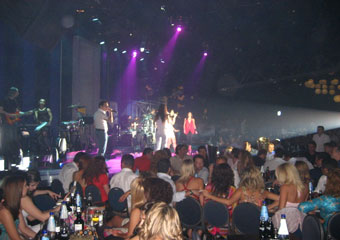
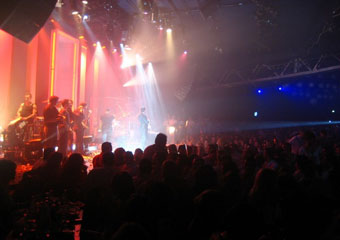
| ANODOS LIVE Pireos 183 tel.: 2103468100, 3103467900 |
ATHINON ARENA Pireos 166, Gazi tel.: 210 3471111 |
| ASTERIA Grigoriou Labraki 2, Glyfada tel.: 2108944558, 2108946898 |
VOTANIKOS Iera Odos 72 & Spyrou Patsi tel.: 2103473835, 2103473914, 697/4488401 |
| ENASTRON Pireos 178 & Lamias 4, Tavros tel.: 2103476606, 2103476772 |
FEVER Syngrou Ave & Lagoumitzi 25 tel.: 2109217333, 2109217622 |
| IERA ODOS Iera Odos 18-20 tel.: 2103428272-6 |
KEDRO ATHINON Pireos 142 & P. Ralli tel.: 2103454888, 2103454108 |
| BO. LIVE Pireos & Mikalis 63 tel.: 2104115700, 2104115707 |
CARAMELA Syngrou Ave 165, Nea Smirni tel.: 2109323560-1 |
| EMBATI NORTH Komvos Varibobis, Kifisia, tel.: 2108071468, 2108075598 |
FIX Syngrou Ave 116 tel.: 2109248211-2 |
| FRANGELICO WINTER Ierofadon 9 & Ieras Odou, Gazi tel.: 2103474477, 2103450038 |
MAYA MAYA Charilaou Trikoupi & Kyprou, Bournaizi Sq. tel.: 2105780040 |
| LA NOTTE Kifisias Ave 10-12, Marousi tel.: 2106846139-40 |
PARALIA LIVE Poseidonos Ave 64, Kalamaki tel.: 2109817980, 2109811105 |
| LE PLAISIR Dimitros & Kastritsis, Ekali tel.: 2108132892, 2108135490 |
SCORPIOS Tournabitou 6, Psirri tel.: 2103240231 |
| SKYLADIKO VIP Syngrou Ave & Athinas 2 tel.: 2109519219, 2109570400 |
STAVROS TOU NOTOU Fratzi & Tharipou, Ν. Κosmos tel.: 2109226975, 2109239031 |
| FOS Iera Odos 7-9 tel.: 2103428053-54 |
|






